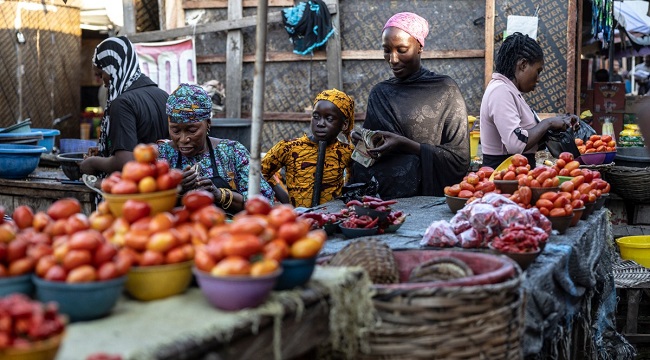Business
Alaje: Food Prices Still High, But Rebased Inflation Benefits Investors

Economist Alaje acknowledges that food prices remain high but says the rebased inflation metrics present opportunities for investors in Nigeria’s economy.
Economist Paul Alaje states that while the National Bureau of Statistics’ rebased inflation figures boost investor confidence, they do not alter the economic realities faced by Nigerians, such as high food prices.
“Previously, food inflation was approximately 51.8%, but according to the latest figures, it now constitutes just 40% of total inflation,” he stated on Channels Television’s Politics Today program on Tuesday.
This doesn’t mean that if you visit the market tomorrow and see lower food prices, it’s true; it would be misleading as our reality hasn’t changed.
“Additionally, individuals considering investing in our country may gain confidence when they observe a reduced inflation rate, and this is essential for us.”
Vendors stand by their fish stalls at the Lokoja International Market in Lokoja, anticipating customers on October 21, 2024. (Photo by OLYMPIA DE MAISMONT / AFP)
On Tuesday, the Bureau updated the Consumer Price Index (CPI), which tracks price changes in goods and services. This update involved changing the reference year for assessing price levels from 2009 to 2024.
The NBS indicated that Nigeria’s headline inflation shifted from 34.80% in December 2024 to 24.48% in January 2025.
A vendor tallies her money as a girl observes at the Lokoja International Market in Lokoja on October 21, 2024. (Photo by OLYMPIA DE MAISMONT / AFP)
Alaje stated, “It would be misleading for people to claim that inflation decreased from 34% to 24%. This narrative is incorrect. If a drop occurs, it should be evident in prices; however, this has not been the case.”
The economist stated that the correct term to use is ‘change’ rather than ‘drop’.
He stated, “The Bureau of Statistics isn’t claiming that inflation has decreased. Instead, they are indicating a shift in the base year from 2009 to 2024.”
In 2009, Nigeria measured employment using a benchmark of 20 hours per week. However, the country now considers one hour per week as its standard for assessing employment.
He mentioned two crucial government decisions—removing subsidies and allowing foreign exchange rates to float—and emphasized that “the smartest course of action is to make the necessary adjustments.”
In his December 2025 budget presentation, President Bola Tinubu conveyed hope that Nigeria’s inflation rate would decrease to 15% by the year-end. However, economists such as Alaje and Bismarck Rewane described this goal as both aspirational and unrealistic.
